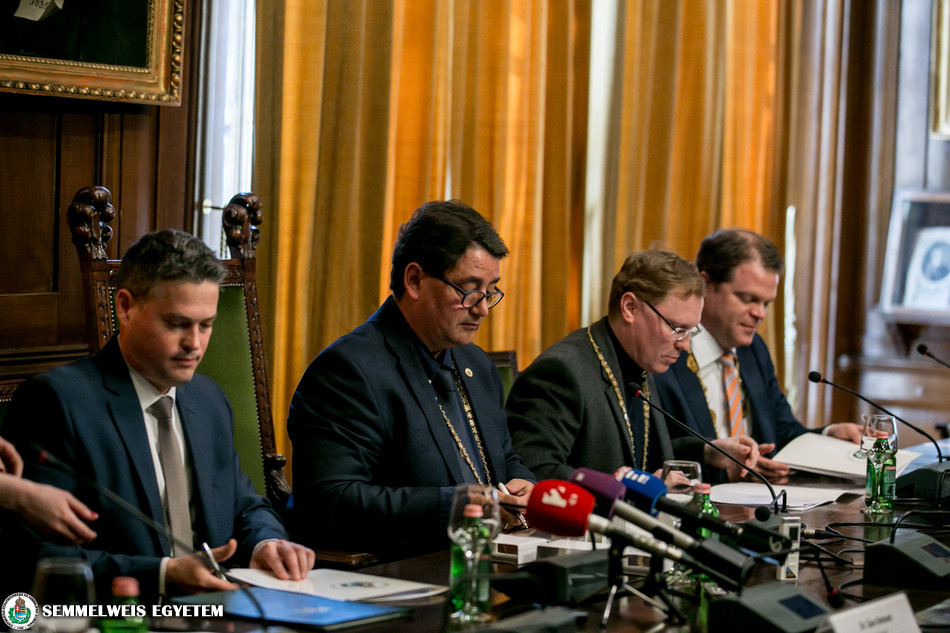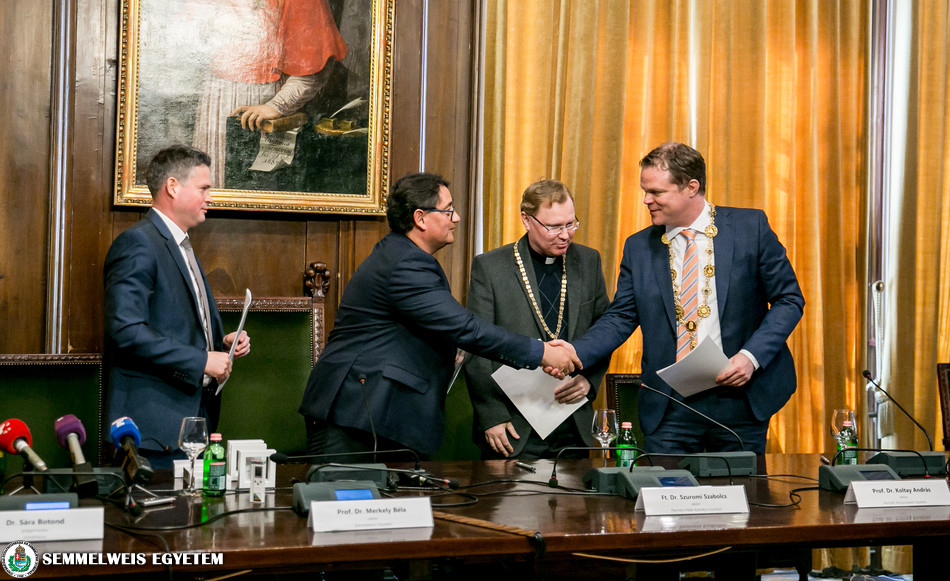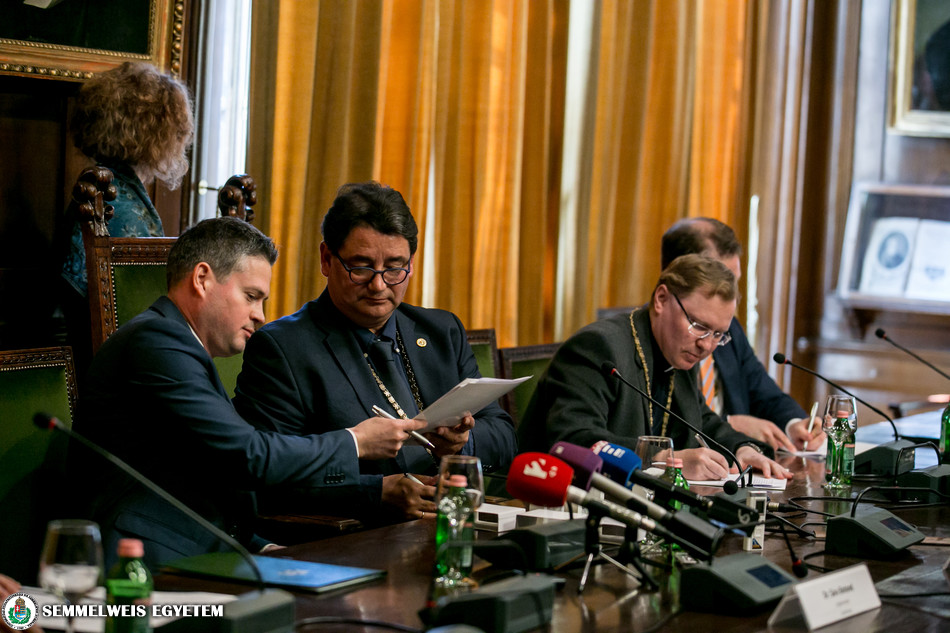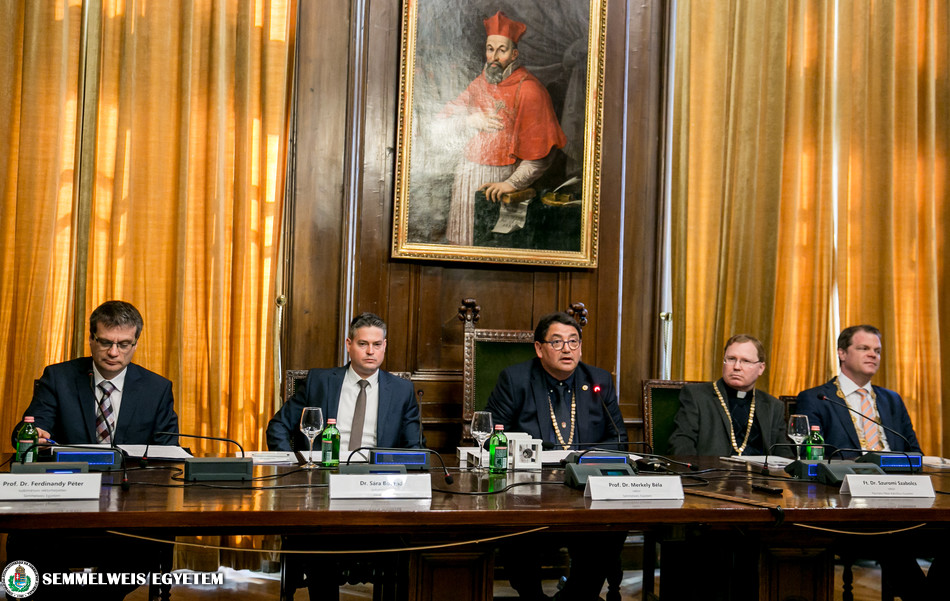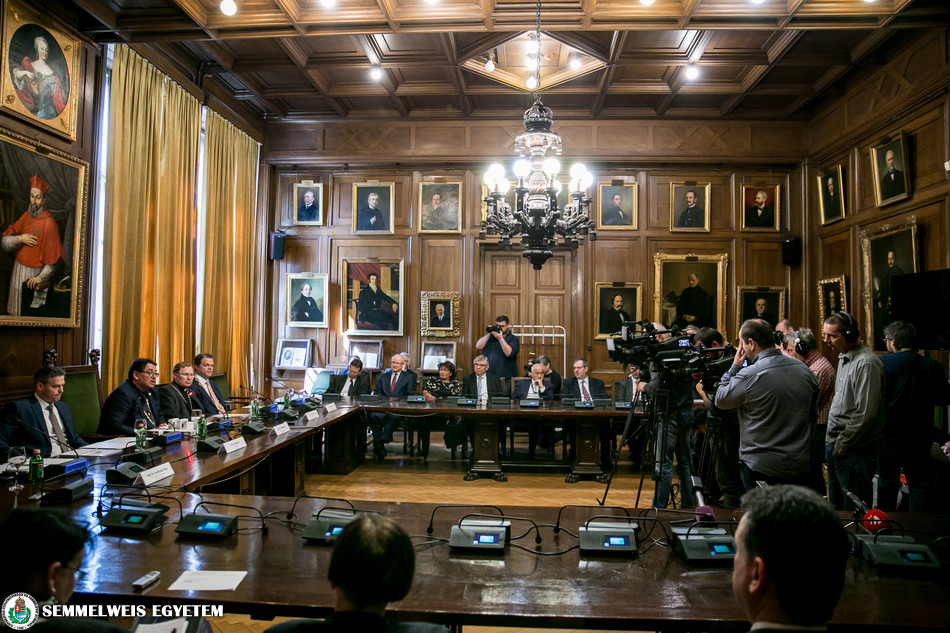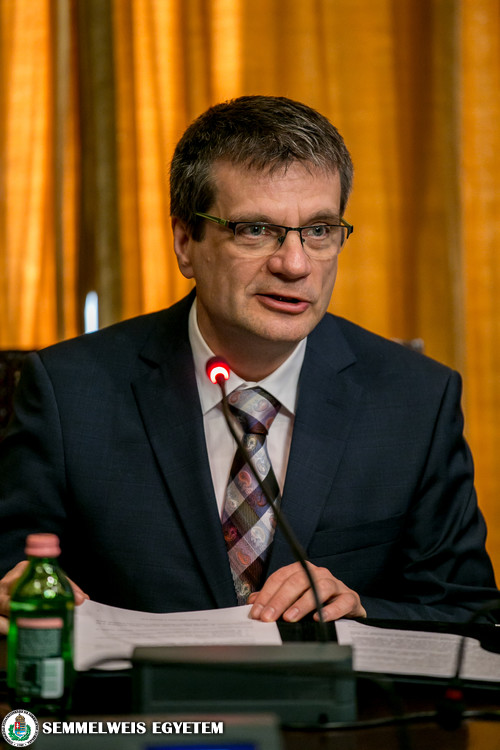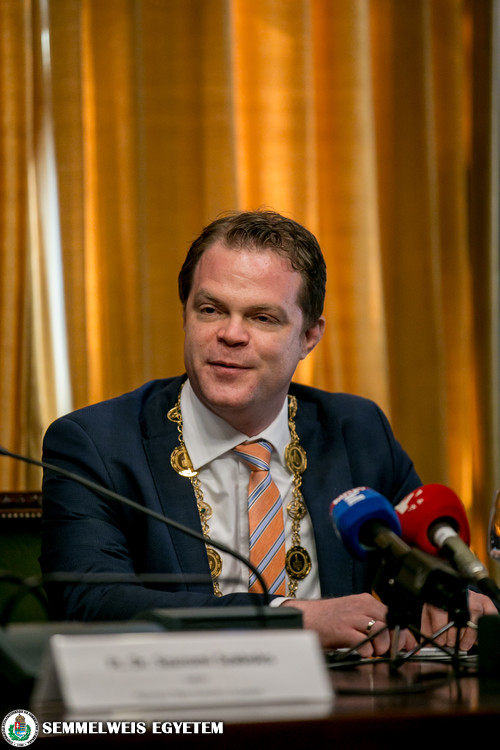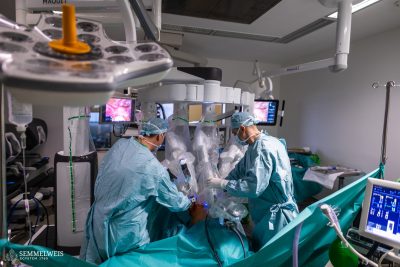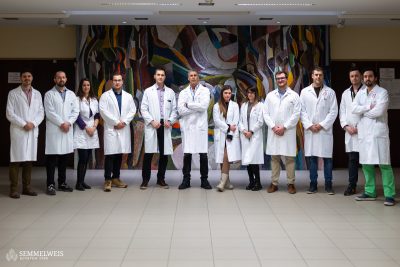Semmelweis University, the Pázmány Péter Catholic University, the National University of Public Service and the local government of Józsefváros (the 8th district of Budapest) have signed a declaration of intent on setting up a joint Health Industry-Biotechnology Science Park. At the public event held in the Senate Hall of Semmelweis University, all of the participants called the signing of the agreement a historic moment that is the start of a new era, and which will strengthen health security and innovation, among others. The Science Park will give home to research, development and innovation activity in the health industry, including biotechnology and pharmaceutical development.
Dr. Péter Ferdinandy, vice-rector for science and innovation, greeted the participants of the official signing ceremony held in the Senate Hall. Dr. Béla Merkely, the rector of Semmelweis University, called the agreement a historic moment in the history of industry and science, which will open a new era not only for the affected universities but also in the history of Hungarian science and higher education.
 The three Hungarian universities, which are each at the forefront of their respective fields, are entering into a strategic cooperation agreement with the intention of establishing a health industry-biotechnology Science Park in the district of Józsefváros that will take on a major a role in the renewal of the research and knowledge base that can be quickly put to use in everyday treatment and patient care, explained Dr. Béla Merkely. It is also the objective of the Science Park to establish close, but flexible cooperation between the players of the health industry, pharmaceuticals, medical technology and biotechnology markets, and provide special support to cooperation in the areas of development and innovation between the participating universities and the Hungarian health industry, pharmaceuticals and biotechnology sectors, which are of national strategic importance.
The three Hungarian universities, which are each at the forefront of their respective fields, are entering into a strategic cooperation agreement with the intention of establishing a health industry-biotechnology Science Park in the district of Józsefváros that will take on a major a role in the renewal of the research and knowledge base that can be quickly put to use in everyday treatment and patient care, explained Dr. Béla Merkely. It is also the objective of the Science Park to establish close, but flexible cooperation between the players of the health industry, pharmaceuticals, medical technology and biotechnology markets, and provide special support to cooperation in the areas of development and innovation between the participating universities and the Hungarian health industry, pharmaceuticals and biotechnology sectors, which are of national strategic importance.
The rector noted that the effort to establish the Science Park is in line with the government’s objectives of increasing the competitiveness of higher education and renewing research-development-innovation, which is included among others in the government decree published on March 8 on “The concept of establishing national Science and Innovation, Technology and Industrial Park networks.”
Dr. Béla Merkely also said that institutions of higher education have to adapt to the rapidly changing world and dynamically changing social, health care and economic needs if they want to meet the new challenges and train the best physicians and professionals. The challenges of the 21st century require that university leaders bring their institutions closer to industry and the economic needs of the market, establishing wide-ranging industry collaborations, Dr. Béla Merkely declared.
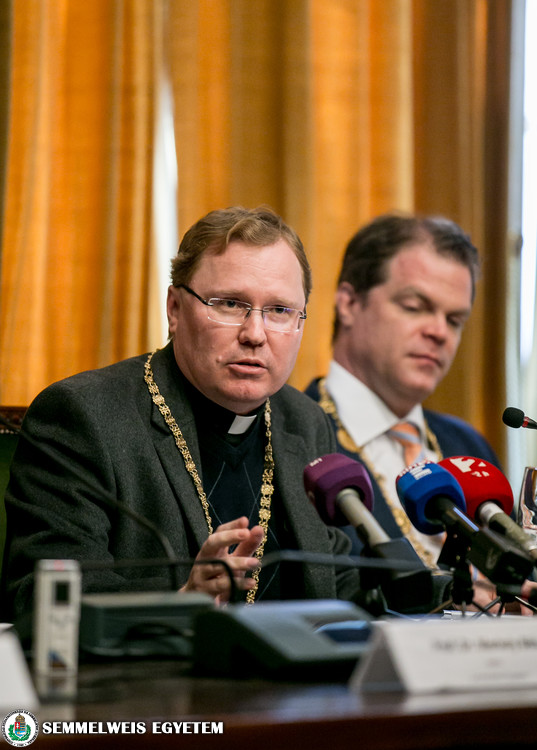 Dr. Szabolcs Szuromi, the rector of Pázmány Péter Catholic University (PPCU), emphasized that this collaboration also supports the promotion of a healthy society. PPCU, in addition to focusing on several areas such as information and bionics research, aims to strengthen especially the ethics aspect of the park. “Nowadays there are new solutions being developed in the fields of biotechnology, artificial intelligence and robotics that also raise serious ethical questions which may have legal and social ramifications,” he pointed out. Dr. Szabolcs Szuromi also noted that these areas of research are increasingly in focus on the international stage as well, thus it is a huge opportunity for Hungary to be able to take part in these processes with the establishment of the Science Park. “There is also immense added value in the fact that the players are not acting parallel to each other, but in collaboration,” he stressed. The PPCU rector also called this a historical moment, noting that the different specific competencies of the three universities provide new opportunities in the scope of the implementation of the government program, which also represent significant points of growth for Hungarian higher education.
Dr. Szabolcs Szuromi, the rector of Pázmány Péter Catholic University (PPCU), emphasized that this collaboration also supports the promotion of a healthy society. PPCU, in addition to focusing on several areas such as information and bionics research, aims to strengthen especially the ethics aspect of the park. “Nowadays there are new solutions being developed in the fields of biotechnology, artificial intelligence and robotics that also raise serious ethical questions which may have legal and social ramifications,” he pointed out. Dr. Szabolcs Szuromi also noted that these areas of research are increasingly in focus on the international stage as well, thus it is a huge opportunity for Hungary to be able to take part in these processes with the establishment of the Science Park. “There is also immense added value in the fact that the players are not acting parallel to each other, but in collaboration,” he stressed. The PPCU rector also called this a historical moment, noting that the different specific competencies of the three universities provide new opportunities in the scope of the implementation of the government program, which also represent significant points of growth for Hungarian higher education.
Dr. András Koltay, the rector of the National University of Public Service (NUPS), called it a great honor that Semmelweis University, which celebrates its 250th anniversary this year, and PPCU, which will soon be 400 years old, chose NUPS as a partner in this project. “We will do everything in our power to articulate the specialties and the body of knowledge that we represent, as well as the needs of public service, in this project,” he said.
 Dr. Botond Sára, the mayor of Józsefváros, the 8th district of Budapest, called the creation of the Science Park a huge milestone not just in education, but for the city and the country as well. The facility will be a source of immense pride for the Józsefváros of the 21st century, which will no doubt have positive effects on the economy, as well as on commerce and innovation. It will give a lot to businesses, university students, job-seekers and of course to local citizens as well, he said. The activities related to the Science Park will increase health security, innovation, and boost academic life. The future starts with investments like this, the mayor stated, adding that the project will not only strengthen the district’s character as a university town, but is of monumental significance to Hungary as a whole as well.
Dr. Botond Sára, the mayor of Józsefváros, the 8th district of Budapest, called the creation of the Science Park a huge milestone not just in education, but for the city and the country as well. The facility will be a source of immense pride for the Józsefváros of the 21st century, which will no doubt have positive effects on the economy, as well as on commerce and innovation. It will give a lot to businesses, university students, job-seekers and of course to local citizens as well, he said. The activities related to the Science Park will increase health security, innovation, and boost academic life. The future starts with investments like this, the mayor stated, adding that the project will not only strengthen the district’s character as a university town, but is of monumental significance to Hungary as a whole as well.
With the establishment of the Science Park, which is on the border overlapping academia and industry, and within that health industry and biotechnology, the coming years are expected to bring developments that will help certain imaging diagnostics tasks using artificial intelligence, improve the efficiency of medical care, and give new momentum to Hungarian bionics, medical technology and pharmaceutical developments that focus on transferring the body of knowledge present in living nature to technical and military practice. Data protection and protection against bioterrorism are also an indispensable part of this. Furthermore, the Science Park will promote the creation of new, smaller, concentrated, technology-intensive companies building on the knowledge base of the universities. A successful innovation eco-system supports the efficient flow of knowledge and workers between small and medium-sized businesses, large corporations and universities by creating new jobs.
The declaration of intent on the cooperation was signed by the rectors of the three universities – Dr. Béla Merkely, Dr. Szabolcs Szuromi and Dr. András Koltay – and Dr. Botond Sára, the mayor of Józsefváros.
Pálma Dobozi
Translation: Tamás Deme
Photo: Attila Kovács – Semmelweis University
